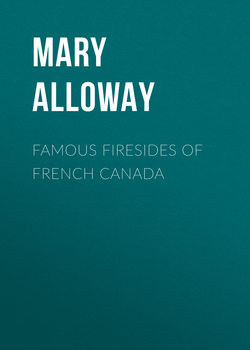Читать книгу Famous Firesides of French Canada - Alloway Mary Wilson - Страница 2
INTRODUCTION
ОглавлениеAbout twelve years after the first Spanish caravel had touched the shores of North America, we find the French putting forth efforts to share in some of the results of the discovery. In the year 1504 some Basque, Breton and Norman fisher-folk had already commenced fishing along the bleak shores of Newfoundland and the contiguous banks for the cod in which this region is still so prolific.
The Spanish claim to the discovery of America is disputed by several aspirants to that honour. Among these are the ancient mariners of Northern Europe, the Norsemen of the Scandinavian Peninsula. They assert that their Vikings touched American shores three centuries before Isabella of Castille drove the Moors from their palaces among the orange groves of Espana. Eric the Red, and other sea-kings, made voyages to Iceland and Greenland in the eleventh and following centuries; and it is highly probable that these Norsemen, with their hardihood and enterprise, touched on some part of the mainland. One Danish writer claims that this occurred as far back as the year 985, about eighty years after the death of the Danes' mortal enemy, the great Saxon King Alfred.
Even the Welsh, from the isolation of their mountain fastnesses, declare that a Cambrian expedition, in the year 1170, under Prince Modoc, landed in America. In proof of this, there is said to exist in Mexico a colony bearing indisputable traces of the tongue of these ancient Celts.
The term Canada first appears as the officially recognized name of the region in the instructions given by Francis I to its original colonists in the year 1538.
There are various theories as to the etymology of the word, its having by different authorities been attributed to Indian, French and Spanish origins.
In an old copy of a Montreal paper, bearing date of Dec. 24, 1834, it is asserted that Canada or Kannata is an Indian word, meaning a village, and was mistaken by the early visitors for the name of the whole country.
The Philadelphia Courier, of July, 1836, gives the following not improbable etymology of the name of the province: – Canada is compounded of two aboriginal words, Can, which signifies the mouth, and Ada the country, meaning the mouth of the country. A writer of the same period, when there seems to have been considerable discussion on the subject, says: – The word is undoubtedly of Spanish origin, coming from a common Spanish word, Canada, signifying a space or opening between mountains or high banks – a district in Mexico of similar physical features, bearing the same name.
"That there were Spanish pilots or navigators among the first discoverers of the St. Lawrence may be readily supposed, and what more natural than that those who first visited the gulf should call the interior of the country El Canada from the typographical appearance of the opening to it, the custom of illiterate navigators naming places from events and natural appearances being well established."
Hennepin, an etymological savant, declares that the name arose from the Spaniards, who were the first discoverers of Canada, exclaiming, on their failure to find the precious metals, "El Capa da nada," or Cape Nothing. There seems to be some support of this alleged presence of the Spanish among the early navigators of the St. Lawrence, by the finding in the river, near Three Rivers, in the year 1835, an ancient cannon of peculiar make, which was supposed to be of Spanish construction.
The origins of the names of Montreal and Quebec are equally open to discussion. Many stoutly assert that Montreal is the French for Mount Royal, or Royal Mount; others, that by the introduction of one letter, the name is legitimately Spanish —Monte-real. Monte, designating any wooded elevation, and that real is the only word in that language for royal.
The word Quebec is attributed to Indian and French sources. It is said that it is an Algonquin word, meaning a strait, the river at this point being not more than a mile wide; but although Champlain coincided in this view, its root has never been discovered in any Indian tongue. Its abrupt enunciation has not to the ear the sound of an Indian word, and it could scarcely have come from the Algonquin language, which is singularly soft and sweet, and may be considered the Italian of North American dialects.
Those who claim for it a French origin, say that the Normans, rowing up the river with Cartier at his first discovery, as they rounded the wooded shores of the Isle of Orleans, and came in sight of the bare rock rising three hundred feet from its base, exclaimed "Quel bec!" or, What a promontory! The word bears intrinsically strong evidence of Norman origin.
Cape Diamond received its name from the fact that in the "dark colored slate of which it is composed are found perfectly limpid quartz crystals in veins, along with crystallized carbonate of lime, which, sparkling like diamonds among the crags, suggested the appellation."
